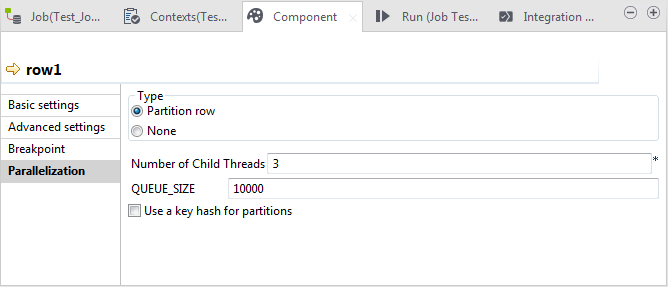Configuring the partitioning step
- Big Data
- Big Data Platform
- Cloud API Services Platform
- Cloud Big Data
- Cloud Big Data Platform
- Cloud Data Fabric
- Cloud Data Management Platform
- Data Fabric
- Data Management Platform
- Data Services Platform
- MDM Platform
- Qlik Cloud Enterprise Edition
- Qlik Talend Cloud Enterprise Edition
- Qlik Talend Cloud Premium Edition
- Real-Time Big Data Platform
Procedure
-
Click the link representing the partitioning step to open its
Component view and click the
Parallelization tab.
 The Partition row option has been automatically selected in the Type area. If you select None, you are actually disabling parallelization for the data flow to be handled over this link. Note that depending on the link you are configuring, a Repartition row option may become available in the Type area to repartition a data flow already departitioned.In this Parallelization view, you need to define the following properties:
The Partition row option has been automatically selected in the Type area. If you select None, you are actually disabling parallelization for the data flow to be handled over this link. Note that depending on the link you are configuring, a Repartition row option may become available in the Type area to repartition a data flow already departitioned.In this Parallelization view, you need to define the following properties:- Number of Child Threads: the number of threads you want to split the input records up into. We recommend that this number be N-1 where N is the total number of CPUs or cores on the machine processing the data.
- Buffer Size: the number of rows to cache for each of the threads generated.
-
Use a key hash for partitions: this allows you to use the
hash mode to dispatch the input records into threads.
Once selecting it, the Key Columns table appears, in which you set the column(s) you want to apply the hash mode on. In the hash mode, the records meeting the same criteria are dispatched into the same threads.
If you leave this check box clear, the dispatch mode is Round-robin, meaning records are dispatched one-by-one to each thread, in a circular fashion, until the last record is dispatched. Be aware that this mode cannot guarantee that records meeting the same criteria go into the same threads.
- In the Number of Child Threads field, enter the number of the threads you want to partition the data flow into. In this example, enter 3 because we are using 4 processors to run this Job.
- If required, change the value in the Buffer Size field to adapt the memory capacity. In this example, we leave the default one.
Did this page help you?
If you find any issues with this page or its content – a typo, a missing step, or a technical error – please let us know!
